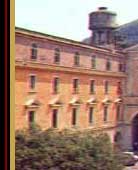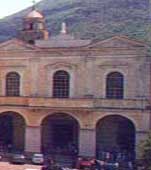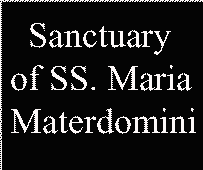| |
The Assumption of Maria on the 15th of
August is the main festival
of the Sanctuary.
Preparations
begin with a month of prayers, from the 5th of July to the 6th
of August, then nine days of preachings and celebrations.
On the day of Assumption you can receive the Plenary Indulgence.
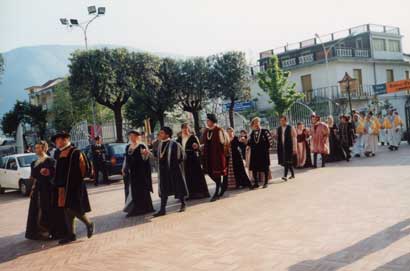
(Historical Figures festival of the
Majo)
Another celebration is on the 1st of May,
Festival of the Majo
The Mayors
of the two local towns, Nocera Superiore and Roccapiemonte,
together with the Priore of the Brothers of the SS. Rosary offer
three leafy branches to the Sanctuary.
Religious,
military and civil organisations take part in official uniform
and processions dressed in historical clothing walk the streets
of the two towns.
The Association
"Il Cortile dei Tigli"
organize the celebrations.
______________________________________________________________________
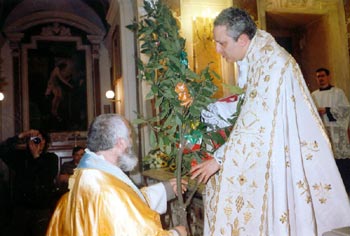
THE ANCIENT MAJO FEAST AT MATERDOMINI OF NOCERA
Origins
- Significance - Development
Italian
Text by Raffaele Pucci
English translation by Pasquale De Maio
The
old barriers among the European peoples are coming down daily
as the latter are moving toward the establishment of a single
world where everybody enjoys the same rights, liberties, and
opportunities.
This, however, cannot and should not eliminate the diversities
which are the wealth of our continent, but should instead harmonize
them.
Hence the moral obligation of preserving the heritage of our
small homelands, not by relegating it to the library shelves
or allowing it to disappear day after day along with the generations
which were its custodians, but by turning it into an yeast for
today's life.
The "Il
Cortile Dei Tigli" (The Courtyard of the Limetrees) Association,
whose Founder and President is Mrs Anna
Sellitto, is moving toward this objective.
It takes its name from the big and ancient limetrees which encircled
the parvis of the basilica of S. Mary Materdomini, and, by acting
as a mediator between the past and the present, aims to promote
the knowledge and love of those places which are "ours"
in the fullest sense of the word, taking act of what they meant
to the past generations and what they can still say to the generations
of the future.
Strictly voluntary and non-profit, the "Il Cortile Dei
Tigli" Association wants to involve in a common sentiment
of belonging not only the individual citizens of every age and
status, but also the Institutions, the Schools, the Parishes,
the religious Communities and the other Associations, through
activities which not only embody the tradition but also contribute
to the social, cultural, and, why not, economical growth of
our homeland.
The Majo Feast intends
to re-propose, in spectacular and modern ways and with full
respect of the religious meaning, a ritual that for centuries
has taken place at the Materdomini Sanctuary on the first day
of May. We have a fairly detailed description of it in an anonymous
manuscript of the year 1758:
In the morning of May 1st, three flower-adorned branches were
brought to the Materdomini Temple: one branch offered by the
inhabitants of Rocca, another one offered by the inhabitants
of the Melloni hamlet of Nocera Corpo, and a third one offered
by the monks and the Abbot who were replaced at the end of '700
by the Confraternity of the Holy Rosary.
The Maj procession was preceded by the mayors of Rocca and Nocera
Corpo and escorted by the soldiers to the parvis of the Sanctuary
where the participants entered to attend the High Mass. After
the Mass, the latter with the monks and the Abbot, went in procession
outside the basilica where the carriers of the Maj's were waiting.
The first one to present it was the mayor of Rocca Monasterio
or the mayor of the whole Rocca during the period when the latter
constituted one single University; then came a gentleman of
Malloni, replaced later on by one of the most notables amongst
the Monastery's vassals; the last one was a monk or a brother
of the Rosary.
Afterwards, while singing psalms, everybody returned to the
Church were the
Blessed sacrament was exposed and the Te Deum was intoned .The
ceremony ended with the eucharistic blessing given by the Abbot.
Today's re-enactment of the feast combines the respect of the
tradition with an evocative summation of the life in the region
throughout the centuries.
On the first day of May every year, a sumptuous historical procession,
proceeding through the streets of Nocera Superiore, from the
palaeochristian Baptistry of S. Maria Maggiore winds up at the
Sanctuary for the solemn offering of the Maj's. Alongside these
symbols of the ancient spring rituals of fertility, the historical
characters re-enact other life events of the region, such as
the visit of Pope Niccolo' II or the feudal homage paid to the
Abbot by his vassals.
The event attracts
every year increasingly larger crowds because of the interest
it holds , not only from an historical standpoint, but also
from a religious, artistic, cultural, and folkloristic standpoint.
It is for everyone a happy moment of social aggregation and,
for the people of the Agro, a strong incentive to strengthen
their present identity which premises their future one.
This success give us the energy to continue overcoming the many
difficulties which are encountered-first of all, the scarcity
of means which is also the result of the choice of total autonomy
made by the Association.
A further encouragement for us to go on is the decision allowing
to associate to the Majo Feast a revival of the Ancient Fair
which was held since the Middle Ages from May 1st to May 8th
in the courtyard of the limetrees.
Will thus come alive again the scenes and the ambiance of the
past, the voices, the attractions, the flavors, the colors,
the sounds, and the noises of the Fair of then.
Today they are no longer alive, overshadowed, even at the folk
festivals, by the modern lights and noises; however, they were
so good, care-free, and reassuring that it is worth reviving
them, at least once a year.
______________________________________________________________________
|
